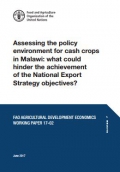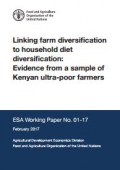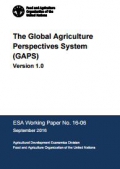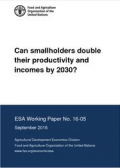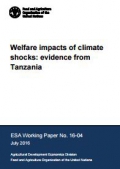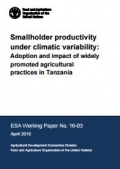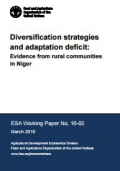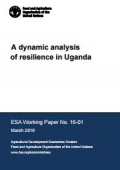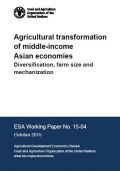FAO Agricultural Development Economics Working Papers
About the series (ISSN 2521-1838)
The FAO Agricultural Development Economics Working Paper series, also known as ESA Working Paper series, was created in 2001 and it collects research and policy analysis on agricultural and economic development. The aim of the series is strengthening the capacity of member countries to improve decision-making on food security and nutrition, resilience, climate-smart agriculture, sustainable markets, agribusinesses and rural transformations.
FAO Agricultural development economics working paper 17-02
Working paper, 2017
This paper examines the main issues affecting producers of export crops in Malawi that could compromise the attainment of the National Export Strategy (NES) 2013-2018 targets. The analysis assesses the level of policy support to...
Available in:English
FAO Agricultural Development Economics Working Paper 17-01
Working paper, 2017
This paper provides new empirical evidence on the nexus between farm production diversification and household diet diversity in East Africa. Starting with a conceptual framework for the pathways from agriculture to nutrition, we use data...
Available in:English
ESA Working Paper 16-07
Working paper, 2016
This paper aims at presenting empirical evidence from Zambia to better understand the linkages between climatic shocks, livelihood diversification and welfare outcomes with the goal of highlighting potential policy entry points to incentivize the types...
Available in:English
ESA Working Paper 16-06
Working paper, 2016
This document provides a full description of FAO’s partial equilibrium modelling system known as GAPS. GAPS has been developed by FAO to study the development of global food markets in the long-term and to assess...
Available in:English
ESA Working Paper 16-05
Working paper, 2016
This paper assesses past trends in agricultural land and labour productivity, as a test whether it is feasible to meet the SDG target 2.3, namely doubling productivity and incomes of smallholders within a 15-year time...
Available in:English
ESA Working Paper 16-04
Working paper, 2016
Sub-Saharan Africa (SSA) remains the world’s most food-insecure region characterized by high levels of child mortality and poverty and low levels of human and physical capital (FAO, 2009). Countries in SSA, including Tanzania, heavily depend...
Available in:English
ESA Working Paper 16-03
Working paper, 2016
Food security in Tanzania is projected to deteriorate as a result of climate change. In spite of the Government’s efforts to promote agricultural practices that improve productivity and food security, adoption rates of such practices...
Available in:English
ESA Working Paper 16-02
Working paper, 2016
This paper provides fresh empirical evidence on the adaptation process to face climate changes through the analysis of original cross-sectional data collected at household-level in Niger. In particular, we identify the main drivers and barriers...
Available in:English
ESA Working Paper 16-01
Working paper, 2016
Resilience is, nowadays, one of the keywords in the policy debate on development. Measuring
resilience and how it varies over time is dramatically important for policy makers and people living in risk-prone environments. This paper applies...
Available in:English
ESA Working Paper 15-04
Working paper, 2015
The agricultural sector of Asian middle-income countries is changing rapidly in line with an overall structural transformation of the economy brought on by economic growth. This paper discusses the changes in China, Indonesia, Malaysia, the...
Available in:English

